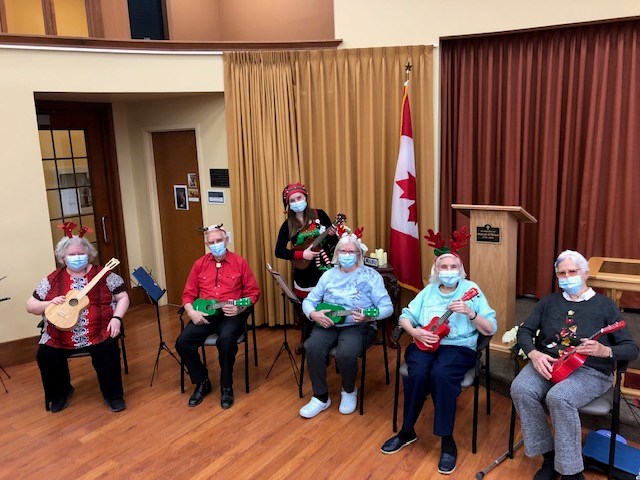For over a century, the Elliott Community has worked to better the lives of seniors in our city.
It was Guelph’s first senior care home and is its only four-level senior care not-for-profit charity and designated long-term care home for The City of Guelph.
The staff and volunteers at the Elliott Community pride themselves on making the golden years the best possible for its residents.
They achieve this through creating a caring, inclusive and home-like community.
“We try to make each day meaningful and purposeful,” said Samantha Corman, Community Engagement Manager at the Elliott Community. “Part of how we do that is by creating a community environment that offers physical, cognitive, emotional, spiritual and social engagement for all residents.”
Enhanced programming implemented at the Elliott Community includes music therapy, virtual reality programs, art therapy, pet therapy, socials and events that bring residents, staff and volunteers together for meaningful, stimulating quality time.
A favourite among residents is the music therapy program that was brought to the Elliott Community through a partnership with Wellington Music Therapy Services.
The program started off small, with just a few hours here and there. Over the last couple years, it has grown, now offered three times a week for those who wish to participate.
Musical activities include learning the ukulele and bell choir, but residents can interact with shakers, xylophones and handheld instruments that make music as accessible as possible for everyone, regardless of their physical abilities. One-on-one sessions and small group sessions are offered.
“We continue to see such a need for it [music therapy] and such a benefit to our residents,” explained Corman. “Even if residents are non-verbal or are unable to communicate sometimes we can connect with them through music.”
Mairead Harrigan, Senior Music Therapist with Wellington Music Therapy Services at the Elliott Community says that music can help activate parts of the brain that can help recall the past, allowing participants to reminisce and access memories that they may have forgotten or buried.
“We can then discuss the memories and feelings brought up by music,” Harrigan explained.
This can also be a helpful tool for participants who were living independently before and are now experiencing a difficult transition into a new environment. Participants can improvise, journal and write songs to communicate their feelings.
“We can use music therapeutically to address different domains - emotional, cognitive, spiritual, physical and emotional,” Harrigan said. “It can be a very cathartic experience.”
Another major benefit is that music therapists can use a variety of different instruments to meet residents where they are and connect with them regardless of their physical abilities.
“Teaching someone to play an instrument or move to music can help reach physical goals,” Harrigan said.
There is also a huge sense of accomplishment for residents when they learn a new instrument.
Musical activities include sensory based sessions for participants who have declined a bit more and may not be able to speak or move independently.
“I will play a song and walk around the room so the residents can hear the sound coming from different areas, or I will set the guitar on their lap and play so they can feel the vibration of the music,” Harrigan explained. “Music can help to stimulate their brain, you can see them smile, toe tapping, or tracking the instrument with their eyes.”
Most importantly though, the music sessions help to increase socialization and build a sense of community among seniors, volunteers and staff. This has been especially critical since the onset of the COVID-19 pandemic, which forced retirement and long-term care homes into a very isolated environment.
“It provides a welcoming space and helps connect residents and staff to bring people together,” said Harrigan.
Ultimately, playing instruments and singing together plays a huge role in helping to enhance the quality of life in later stages.
“Seeing the everyday joy music can bring to residents and how a small interaction can brighten their spirits is really rewarding,” Harrigan said. “I leave the room and they are smiling, dancing, singing, sharing with other residents their experience.”
Programs offered at the Elliott Community, like music therapy, help those living there to live their life to the fullest and find meaning in each day.
The Elliott Community is always looking for volunteers. To learn more about how you can get involved, click here.
The organization relies on fundraising to provide recreational activities and social events for its residents. If you are looking for more information on how to support, contact Rebecca McKinlay, Donor Relations Officer, here.
The Elliot Community offers lifestyle choices for seniors, including life lease, retirement supportive living, assisted living and long-term care. For more information, click here.
